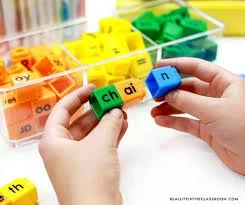Literacy
At ELD, we provide state-of-the-art literacy instruction grounded in the science of reading. Our comprehensive approach covers the five essential components of reading, along with spelling and writing instruction. These five components are:
Phonemic Awareness: The ability to hear and manipulate individual sounds in spoken words—an essential foundational skill for learning to read.
Phonics: Understanding the relationship between letters and sounds, which forms the basis for decoding and encoding words.
Fluency: The ability to read smoothly, accurately, and with appropriate expression.
Vocabulary: Developing an understanding of word meanings and their usage.
Comprehension: The ability to make meaning from text and fully understand what is being read.
All ELD tutors are trained in the Orton-Gillingham approach, a highly regarded, research-based method for teaching reading. Particularly effective for developing phonics, decoding, and spelling skills, Orton-Gillingham is a structured literacy approach that breaks reading and spelling into manageable parts that build over time.
Key features of the Orton-Gillingham approach include:
Multisensory Instruction: Engages visual, auditory, kinesthetic, and tactile modalities to enhance learning and retention.
Direct and Explicit Teaching: Concepts are taught clearly and directly, leaving no room for ambiguity.
Structured and Sequential Lessons: Skills are introduced in a logical order, with each new concept building on previous knowledge.
Individualized Instruction: Lessons are tailored to the unique learning profile of each student.
Diagnostic and Prescriptive Approach: Tutors continually assess student progress and adjust instruction to meet evolving needs.
In addition to Orton-Gillingham, our highly trained and certified educators draw from a variety of evidence-based strategies and interventions to support students in areas such as reading comprehension, vocabulary development, and written expression.

